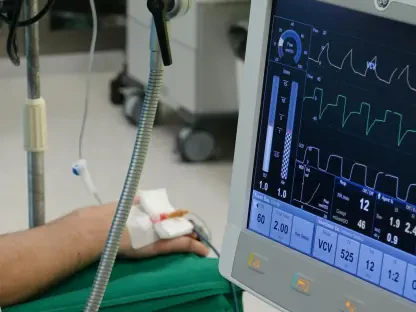In the heart of Southern West Virginia, a transformative step forward in cancer care has emerged, promising to reshape the landscape of medical diagnostics for rural communities. At the Beckley Cancer Center in Beckley, a pioneering mobile PET/CT scanner has been introduced, marking a significant milestone in the fight against cancer. This cutting-edge technology, unveiled during a ceremonial ribbon-cutting event with community leaders and healthcare executives in attendance, represents a beacon of hope for patients who previously faced long journeys for advanced diagnostic services. The collaboration between CAMC-Vandalia Health and a leading technology partner has brought this innovative tool to the region, spotlighting Southern West Virginia as an emerging hub for healthcare innovation. This development not only enhances early detection but also underscores a commitment to bridging the gap between urban and rural medical access, ensuring that life-saving care is within reach for all who need it.
Cutting-Edge Technology Enhances Diagnosis
The mobile PET/CT scanner stands out as a remarkable advancement in cancer diagnostics, combining positron emission tomography (PET) and computed tomography (CT) into a single, powerful imaging system. This dual-imaging capability produces high-resolution digital images that surpass the accuracy of traditional methods, offering a clearer picture of a patient’s condition. While a CT scan can detect the presence of a mass, it often falls short in identifying whether that mass is cancerous. The PET component, utilizing a radioactive tracer, highlights cancerous lesions with striking clarity. When these images are overlaid with CT data, healthcare providers gain precise information about the location and nature of tumors, which is critical for effective treatment planning. This technology’s ability to pinpoint even the smallest lesions ensures that diagnoses are more accurate, ultimately leading to better patient outcomes and tailored therapeutic approaches in Southern West Virginia.
Beyond its diagnostic precision, the mobile PET/CT scanner addresses a long-standing challenge in oncology: early detection in underserved areas. For many rural patients, the lack of access to such sophisticated tools has meant delayed diagnoses and compromised care. With this mobile unit, the barriers of distance and resource scarcity are being dismantled, as the technology brings state-of-the-art imaging directly to the community. Radiologists and medical professionals have emphasized that the integration of PET and CT imaging not only enhances the speed of diagnosis but also reduces the need for multiple tests, streamlining the process for patients who are already navigating the stress of a potential cancer diagnosis. This innovation marks a turning point, ensuring that rural healthcare facilities are equipped to offer the same level of diagnostic excellence as their urban counterparts, fostering a new era of health equity across the region.
Expanding Access to Rural Communities
One of the most profound impacts of the mobile PET/CT scanner lies in its ability to expand advanced oncology services to rural areas of Southern West Virginia. Operating on a rotating schedule, the unit is available at the Beckley Cancer Center three days a week, with additional days allocated to Greenbrier Valley Medical Center and Princeton Community Hospital. This strategic scheduling ensures that a wider population can benefit from cutting-edge diagnostics without the burden of traveling long distances to urban centers. Historically, rural communities have faced significant challenges in accessing specialized medical resources, often resulting in late-stage cancer diagnoses. By bringing this technology directly to these areas, healthcare providers are addressing a critical gap, offering patients a chance for earlier intervention and improved survival rates through timely and accurate assessments.
Further enhancing this accessibility is the broader vision of the Vandalia Health Network, a collaborative entity formed through strategic partnerships among regional health systems. Plans are in motion to establish a comprehensive medical suite on Harper Road in Beckley by late this year, integrating services such as radiology, primary care, and MRI under one roof. This initiative reflects a commitment to building a robust healthcare infrastructure that meets the diverse needs of the local population. The presence of the mobile scanner, coupled with these upcoming facilities, signals a shift toward a more inclusive healthcare model where rural patients receive care comparable to that in larger cities. Community leaders have hailed this development as a game-changer, noting that it not only improves medical outcomes but also strengthens the region’s economic and social fabric by keeping critical services local.
Community Engagement and Future Impact
Community awareness and engagement form a cornerstone of this healthcare revolution in Southern West Virginia. Local organizations, including the Beckley-Raleigh County Chamber of Commerce, are actively working to inform residents about the availability of advanced diagnostic tools like the mobile PET/CT scanner. The goal is to reduce the necessity for patients to seek specialized care outside the region, thereby saving time, reducing costs, and alleviating stress. By fostering a deeper understanding of these local resources, the chamber and healthcare providers aim to empower individuals to take charge of their health, ensuring that cutting-edge services are not just available but also widely utilized. This focus on outreach highlights a broader trend of prioritizing accessibility and innovation in healthcare delivery, positioning the region as a leader in medical progress.
Reflecting on the rollout of this technology, the collaborative efforts among healthcare executives, technology partners, and community stakeholders stand as a testament to what can be achieved through unity and vision. The ribbon-cutting event at Beckley Cancer Center symbolized more than just the arrival of a new tool; it marked a renewed promise to prioritize health equity. Looking ahead, the success of this mobile unit could pave the way for similar initiatives across other rural regions, inspiring a national movement toward accessible cancer care. Stakeholders are encouraged to continue exploring ways to integrate advanced technologies into community health systems, ensuring that no patient is left behind due to geographic barriers. The momentum built through this project offers a blueprint for future advancements, with the potential to transform countless lives through sustained investment in rural healthcare solutions.









